Topics in Paleobiology
 |
| Balaur bondoc life reconstruction by Christopher DiPiazza. Here it is depicted exhibiting either predatory behavior or possibly play behavior on an unlucky baby crocodilian. |
Poem
Topics in Paleobiology
Dinosaurs and Birds
Explanation
This poem is based on a fairly recently discovered fossil from Romania. There is a lot of debate whether the animal was a dinosaur or an early bird. The fossil remains were found in a land that is considered to be the subject of myth in Western literature. The animal has a unique anatomy as it evolved in an island environment so while it has equivalents in North America, the animal itself is very small.
The Romanian Dinosaur Balaur Seems to Be a Flightless Bird
Balaur: Prehistoric Beast of the Week
The poem is based on the idea that the West treats Romania as a romantic entity with the culture there as a curiosity. When in reality Romania and Transylvania have quite a poisoned past. In the past it was a country that caused a lot of harm on the people who lived in the area. There were ethnic based killings at 20-30 years interval. A lot of people moved out of the region as they got increasingly fed up by being treated like dirt by the government and the landscape being dangerous rather than romantic.
The poem is essentially based on 3 elements, the Balaur bondoc dinosaur, Franz Nopcsa von Felső-Szilvás and the history of Transylvania.
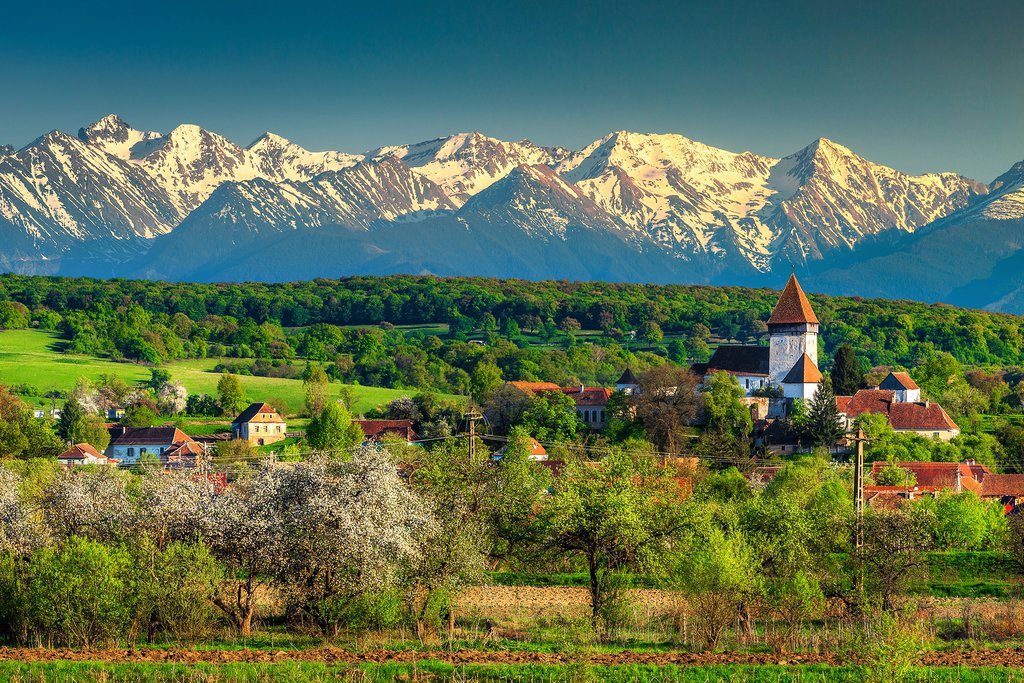
Historic Saxon villages with fortified churches set under the shadow of the stunning Carpathian Mountains
Franz Nopcsa von Felső-Szilvás was a famous paleontologist who discovered the island phenomena in evolution, he created the science of paleobiology and was the first ethnographer of Albania. He did meet an unfortunate end by his life being destroyed in WW1 and due to the treaty of Trianon.
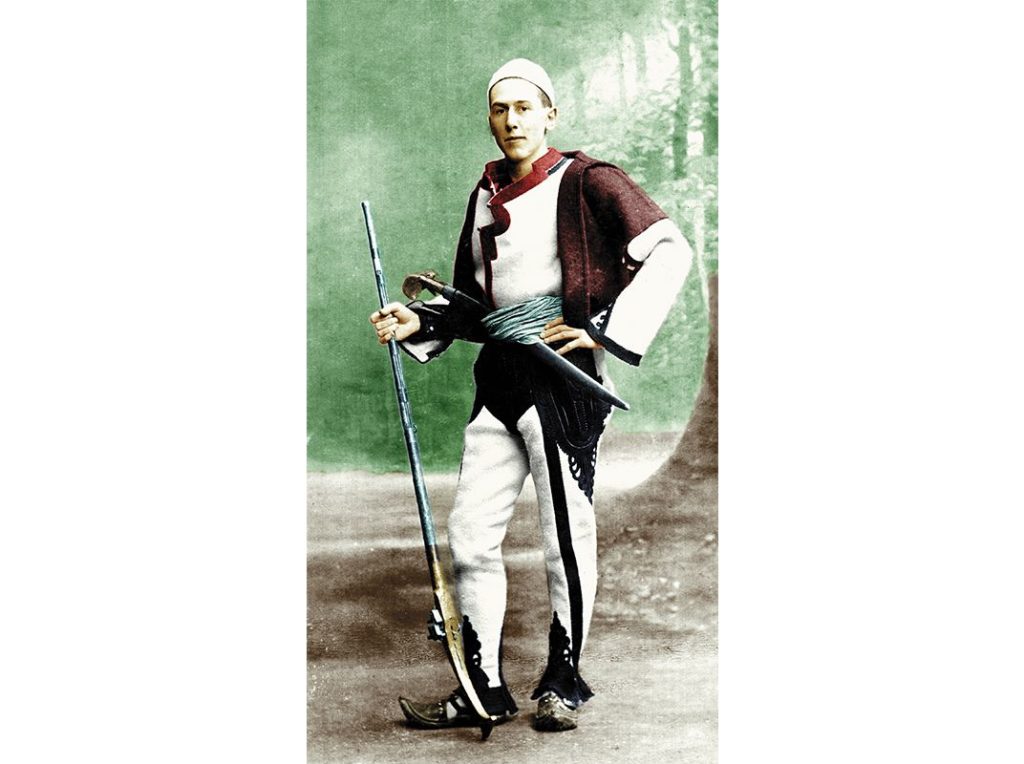
After an early foray into the Albanian Alps, Nopcsa posed for Austrian imperial and royal court photographer Carl Pietzner dressed as an Albanian warrior. (Carl Pietzner / Restoration and colorization by Dacian Muntean)
Warning, this poem is quite dark. It is partially based on the genocides of various people that happened in Transylvania. The people in Transylvania are proud of their heritage, yet would not acknowledge how they for example exterminated the Jews from the area with the help of the Nazis or how they helped to deport 70,000 Germans to Siberia with the help of the Soviets. What I find the most disgusting is that these ghouls keep clinging to their flags, no matter how blood soaked those fabrics are, and how many of the decent folk from that region move away to other lands.
The poem’s villain is Balaur Bondoc. The English name is stocky dragon. I do dislike the name given to the fossil, as I think it was mistranslated by the Romanians into English. In Romania the word for Dragon is not exactly Balaur, it is zmeu. Balaur is a malevolent spirit that controls bad weather and tends to be responsible for people going missing in the forest. The entire situation of the history of Transylvania can be described as a balaur.
The colour scheme of the poem it is Red-White-Green and Blue-Yellow-Red, after the flags of Hungary and Romania as they represent how both countries managed to destroy Transylvania with their military wranglings. It has a dual meaning. Bit of a warning, this poem is a bit dark on purpose.
The Revolution of 1848–49 in Transylvania and the Polarization of National Destinies
1848–49 massacres in Transylvania
Geamana – The Romanian Village Flooded by a Toxic Lake
Balaur Bondoc, Dinosaur or Bird? Or something else? Or a Song of Doda.
There is a dragon in the East, hiding in the forest and rock.
It is a stocky, weird creature from the distant past,
Only found with due luck!
Some say it is a dinosaur, some say it is, a bird,
A creature from the land beyond the forest,
Hidden within tall mountains, majestic castles and warm summer showers that have the sweet smell of earth.
The creature is covered in feathers,
Lays eggs, and nests its young,
Two massive claws on the front feet,
As it jumps from branch to branch,
Its long tail covered in beautiful feathers,
It dances in the light, that shoots through the leafy cover,
It spins through with great grace across the flowery forest,
It glides in the gentle breeze as she looks out on the lush farm fields,
On the meadows of the Land of Szekelys, Saxons, Armenians, Semites, Romanians, of all creeds.
Their towns made of rustic little houses,
Tucked neatly into the green valley,
All the roofs covered in golden yellow hay,
Little fences run between the cottages,
As the centre road leads to the distant church tower,
Next to the Cross of Christ, a synagogue,
A blocky building painted in merry orange and decorated in colourful lead glass,
Next to it another church, of the Unitarians,
A virgin white flag flutters on its spire,
On it the Dove of God,
Standing tall and proud on the green hills,
Topping the dove, is a blessed crown of many jewels,
The entire entourage rounded by the silver Ouroboros.
Cows belch away in the distance,
As little bells jingle away,
As young lambs skippity hop,
Across the green plots,
They stretch from the white washed walls of the houses,
To the West, to the edges of the forest,
To the East, onto the shores of an emerald azure lake.
A truly bright blue sky enlightens the day,
As the sky and the lake join together,
As our attention returns to the green patch of the forest,
To the creature, resting on the branches,
As fluffy little clouds like her feathers,
Gently drift over the tree line, over the richly flowing rivers.
The waters sparkle in the sunshine ,
Like her deep eyes,
As each stream enters the deep blue lake, rich with fish,
The riverbanks buzz with life,
A heron wobbles in the shallow waters,
A flock of ducks take off from the blue surface,
A kingfisher dashes into the lake,
A bee-eater glides across, catching a lazy fly,
A red-backed shrike chases behind,
Eagles circle far above.
A Concert of Europe.
A chorus of birds sing from the marsh running between the woods and the water.
A man with a tall mustache,
Pushes away his boat from the shoreline,
He is dressed like one of those Albanian shepherds,
That from time to time wonder over the border,
A sword and pistol tucked into his silk belt,
With a shepherd’s sheep fur coat on his back,
He wears a tall, fur black cap.
He rows his boat with great confidence,
A dashing fellow,
The son of the black crow,
In his boat a few loose bones of dragons,
Maps and charts of broad colours,
And some scattered books with folded pages:
Le Château des Carpathes by Jules Verne,
Szegény Gazdagók by Jokai Mór,
The History of the Progress and Termination of the Roman Republic by Adam Ferguson,
Götz von Berlichingen by Johann Wolfgang von Goethe,
O scrisoare pierdută by Ion Luca Caragiale.
This shepherd is indeed well educated!
The Albanian continues his journey across the lake, with each strokes,
He eagerly looks over the broad green horizon.
The flying creature watches him from the rich green tree branch,
As she breaks into a regal song,
That could touch a heart,
(Well… It does!)
She is a regal creature to behold,
Balaur Bondoc,
As the man of modern would call it, stocky dragon,
Named after the noble creature,
Stocky for her short posture,
Her Loyalty is named after true beauty!
But don’t let this creature truly fool you!
As there is a mistake in the translation of its name,
Connected to its fame, Like the land it hails from,
Balaur doesn’t mean dragon at all,
Dracul or Zmeu would be more appropriate to call.
Balaur is more of a malevolent spirit,
Creeping through the woods,
Conjuring storms,
Ready to devour the weary traveler.
As that land does as usual.
One can still turn back!
Covered in deep forests,
Where light barely reaches at all,
Where the bear and the wolf creep through the foliage,
The forest like a labyrinth ready to trap,
In the deep valleys,
Where very few dare to wander,
The red, murderous lakes and waters ready to kill,
Where the winters are harsh,
Screaming winds ripping through the frozen forests,
Where the mountains slide and rock rumbles,
The floods of spring, dragging men into the abyss,
A land covered in the rusting tanks of the Third Reich,
With Communist blocks scaring through the land,
Where the collectivized farms still stand,
Where a thousand shells rained,
As towards the Motherland the Germany army marched,
The Crusading knights dared the lands,
But none came back,
Even the Saxons dragged away by the Russians to frozen lands,
Where the Ottoman and the Habsburg clashed,
Jewish people cried and sobbed,
As the trains rolled towards Auschwitz,
The Hungarian and the Romanian stabbed each other through the heart with bayonets,
It seems one cannot sit on the sharp blades, as the Frenchman Talleyrand said,
The canons of 1848 flash,
Balls of iron and rock rip through the flesh,
Followed by even more fiery speeches!
Great mass of crowds clash,
The troops of Poland, Russia, the Empire of Austria and the old kings of Hungary smash,
The songbirds fall silent,
A tiny, black, fluffy warbler gets swept up in the tide,
Poor Pusztafi,
Up in Segesvár,
It died,
His faith in the land completely blown up.
Ashes scattered up into the mist.
Some people did call for calm but only met spikes,
As Metternich the Austrian bitterly remarked:
“There is no order here as a foundation!
Only the cry for freedom, a selfish freedom!
Nothing more than the attempt of some group or another,
To achieve its own ends!
When the freedom of these fiends is carried out in order,
The only expression is the cold blood coated iron bar of tyranny,
Crushing the life of the peaceful many!”
But his voice is drowned out by the angry screaming mob,
They want to see blood,
Blood flowing on the ground,
They do not care whether it is Hungarian blood,
Armenian blood,
Jewish blood,
Saxon blood,
Or Romanian blood,
They just want to see blood!
They want to taste it,
They want to slurp it,
They want it to run across their teeth,
A mad crowd,
Morphing into a monster with a broad, blood dripped smile,
Their humming sends chills down the bone,
There is not even a drop of humanity there,
And they scream,
Scream!,
Day and night,
Their voices merge into the storm that broke out from the dying horizon.
The sounds of one cruel Concert of madness!
Storms ripping through the land, as lighting, thunder reverberates between the mountains,
A torrent of rain, cold and thick, rips through the skin,
It taps away, splashes away on the rocks,
Wet rocks, that surround the winding road,
The tall, hilly roads, knee deep in mud,
If one isn’t careful, you sink,
You sink into the tar, into the Abyss…
Tall mountains, covered in thick woods, where terror reigned as the true king,
Those deep, dark lands.
*
The Romans called to their Hellenic Gods in fear,
The Catholic crosses with due terror as the creatures creeps near,
Hunor and Magor say the prayer of the Táltos,
As shadows stalks their rear.
The Greek-Orthodox Byzantine calls for the protection of Heaven,
As the claws shear,
The Ottoman screams out for the strength of the Caliph of Istanbul,
As the teeth tear,
The National Socialist and the Fascist, heil their Hitler,
As their bones shatter, their blood smear,
The Communist swears in anger for Stalin and Marx,
As they all get consumed by the deep dark lands.
*
Ceausescu’s tall statue is no more,
Only two legs stick out of the hill, like two burnt tree stumps,
His upper torso, his head and an arm reaching for the sky,
Stick out of the charred earth,
The legs, darkened concrete and rusted iron,
Stare down the smoke chocked valley.
The village is no more,
Only the church tower,
Like an old crooked man,
Sticks out in the middle,
Its roof has mostly caved in, with large chunks of the masonry missing,
On the spire a ghost haunts the village,
A white apron, picked up by a sluggish wind,
A flag?
The old fabric is sickly yellow, only with hints of white, ripped into pieces,
On the rooftop, dead pigeons lie, rotting away,
Maggots crawling out of their bellies.
The rest of the valley? The rest of the village?
Beneath,
Beneath the lake covering the entire valley,
The whole region been flooded when the dams were built,
The dams, to generate electricity for Communist power,
To direct the water for mining,
For the State, for the Company,
So they can lay their claws upon the treasures of the mountains,
The Mountains are no more.
In the distance, barren as bones,
A carcass, with massive holes on the hillsides,
Like eye sockets on a skull,
All mined out for the blood, for the gold, for the copper.
The lake is sick,
Nothing lives there,
Poison,
The land is poison,
The waters are poison,
The air is poison,
And the lake?
The lake is still growing,
Each year the poisoned waters rise,
Consuming more of the land,
Sickly patterns in the lake,
Consume and consume,
Their colours of scarlet, grey, black and death,
Orange mixes with purple, green and yellow to create hypnotic ripples,
As the demon lake eats away at the barren shores,
This land is no more.
Up from the valley,
Far above the sea of the dead,
The forest is no more.
Only barren hills,
Sickly green hills, brownish and uneasy grey,
Not a sound in the air, everything is deathly quiet.
Tall on the hill,
On poles reaching the sky,
The Hammer and Sickle,
The Circle of Stars,
And the Star-Spangled Banner flutter with pride.
*
But what of the creatures?
Did they demise?
Well, we need to go back further in time!
*
One of the firsts to see these creatures, these dinosaurs of the past, the island hoppers,
Miniature creatures with a great story to tell,
They were the Hobbits of times past,
When the land was an archipelago,
Out on the warm tropical sea.
A Hawaii of the past.
These creatures?
Their Captain Cook?
Their discoverer?
A Pannonian Hungarian (Who he was lost to time, to folklore),
Or was he a Vlach Romanian?
The name? Franz Nopcsa von Felső-Szilvás,
Quite a mouthful, as he was a Lord of noble birth.
He was a dashing young fellow, interested in everything, a polymath to his name.
He saw the world, saw a war, rode around on his motorcycle around the Old Continent.
He was due to be the King of Albania,
But treachery stripped him of his rights,
As borders of countries shifted to the Devil’s great delight.
He was the man who discovered island dinosaurs,
Miniature creatures,
He wondered the woods consulted with these beings,
But couldn’t see the true monsters that creeped near!
They set his castle on fire, drove him out of his lands,
Smashed the armour on his head, cut open his hands,
He had to escape to Budapest than to Vienna,
With his fortunes and noble title stripped,
As he was pursued across the plains and swamps,
Buzzing in the sky, flying,
Away, away…
With a pistol pressed to the forehead of the Communist pilot…
European life was nothing but bitter…
Poverty creeping around the corner…
His doom came in a cosy bed,
As in despair he shot his lover and himself dead.
While all these horrible proceedings were happening,
Balaur sat in the corner laughing,
Lips licked with the blood of the dead,
As the monstrous head bobbed in and out of the shadows near the deathbed,
The tongue ran back and forth on the razor-sharp teeth,
As the beak exploded, again, with unbreakable laughter,
Its stocky feet clamped on the floor, as it was giddy ever after.
The yellow eyes glowed in the dark,
Great evil, extinguishing the light.
The claws sickly green,
With speckles of red decorating, jewels for Her mean Queen,
The stench of blood is everywhere,
Red blood,
With a great deal of it covering this beast of heathens,
Like a sick red armour, the fluid of life,
Blood of the dead coats the long tail feathers.
This mass of dark red begins to groom its grey bloody feathery crown,
One by one, lick by lick, one must be clean!
The shaken feathers are adjusted,
A new shape taken up, dark and majestic.
Now with the grooming down,
This dark spirit jumps and scrambles on the bed of Nopcsa,
It settles down on his chest,
As it would be just all in jest,
Its beak curves into a smile, as sharp teeth reveal,
With anticipation he stares the Baron in the eye,
A glassed over eye,
Eyes completely white.
Its voice shrieks through the room,
“Was all this worth it Baron Nopcsa?”
The creature is not done,
White teeth again revealed,
The beak moves near and near,
The yellow glowing eyes grow, ever larger and larger,
Now they are eye to eye, here to the ever after,
The yellow orbs drift to a strange peace,
The two, seem strangely calm at this place,
Gently, the beak is rubbed against the Baron’s face,
All the savagery has melted away,
He takes his hair into her beak,
Gently, she begins to sweep,
He combs his hair with her broad teeth,
With great care,
With a certain kind flair,
“Shh, Shh, here, here.”
Once more silence settles.
Suddenly the Queen breaks into mad laughter,
She asks again with terrible thunder:
“Was all this worth it, Baron Nopcsa!”
The room is shaken with wrath,
Which once more melts away into uncontrolled laughs,
Feathers ruffled, passions high, as if the Devil is playing his funeral pipes,
The creature sinks back into melancholic silence,
As she sits on the dead Baron’s chest,
Like it would be her nest,
It looks back,
“Was all this worth it, Baron Nopcsa.”
It remarks with a sigh again.
More giggles, drowning to sobs, fill the room,
The dark mass stands up once again,
The yellow orbs survey this doomed place,
Piercing through the greying atmosphere,
The sobs disappear entirely, as the creature begins to,
Once more, (ha, hA, HA!)
Laugh maniacally, with laughs dying into chuckles and chortles,
It giggles, hopping back onto the floorboards.
As the Sun truly disappears behind the horizon,
Light runs up fully on the walls of the room,
The blue of the walls becomes ever darker,
Pitch blackness creeps around, as the shadows fully take over,
The yellow burning eyes are still there,
A dead silence lingers in the room,
Only interrupted by feathers ruffling and crawling of the digits of each claws.
Like a lone soldier, the dark creature stands guard,
No mortal could figure out whether it was glee or plight.
The creature bursts open again!
Nothing but laughing and cackles,
As if a great comedy was just witnessed…
It suddenly goes quiet as it remarks with dead seriousness:
“Such a shame really…”
“What is this world: sick, miserable, and poor?”
She takes one last look at the dead Baron,
A bride to be,
As He surveys the silence in the room,
Suddenly the black dragon becomes animated,
The stocky feet scramble across the floor,
As tap, tap, TAP! a moving shadow moves across the room,
It disappears into whichever evil darkness it came from,
An unsettling quiet settles down on this tomb.
Welp, this was dark. Sorry about that. The poem focuses on environmental destruction in Romania which was done by multiple companies and Communists, who destroyed entire communities in search of gold, uranium and copper.
The village in Transylvania sacrificed to toxic sludge
It’s not just vampires and bats that make Transylvania eerie. The village of Geamana was abandoned as a dump for toxic waste from a nearby copper mine
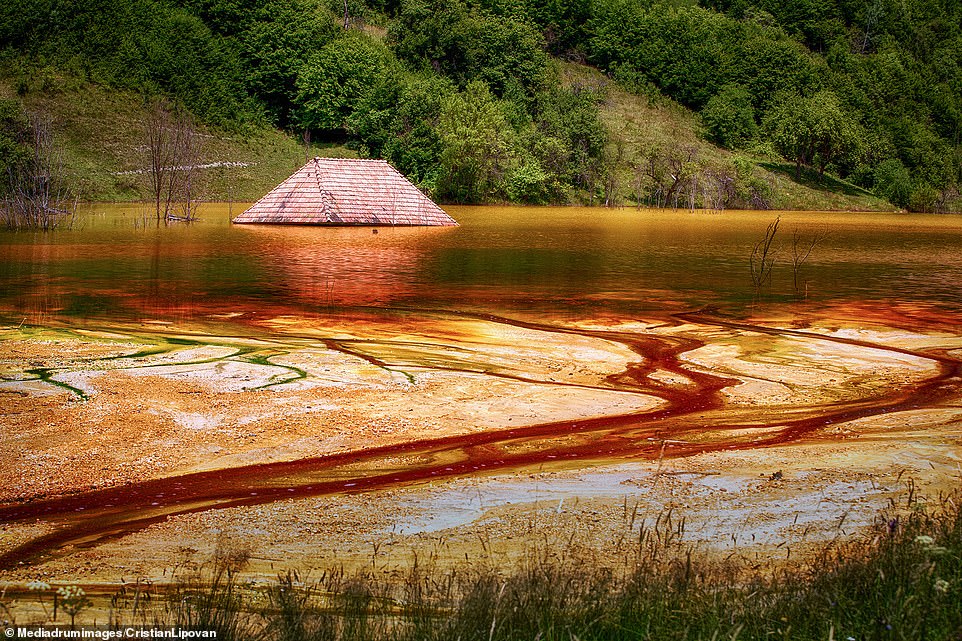
When the flooding was announced in 1977, hundreds of families were forced to evacuate. The roof of one of the former family homes pokes above the surface of the sludge.
Along with villages entire cultures were wiped out for ideology, progress, money or whichever crazy dreams Hitler, Stalin or Nicolae Ceaușescu cooked up. Even today at places like Rosia Montana, the Roșia Montană Gold Corporation, a Canadian company kept pushing to start up mining operations.
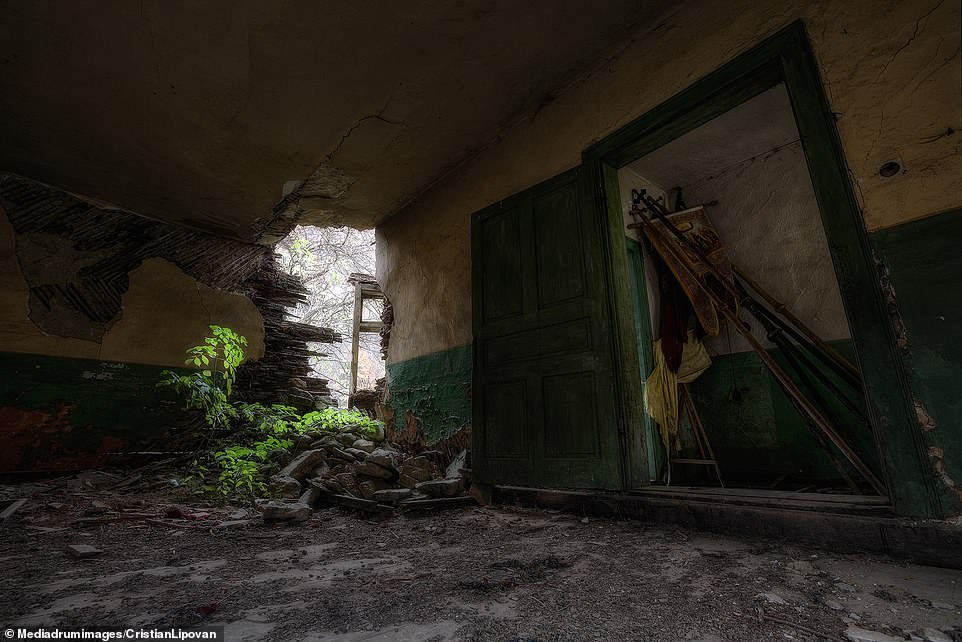
The interior of one of the abandoned homes shows what appear to be primitive measuring stick gauges next to a flag in a large cupboard
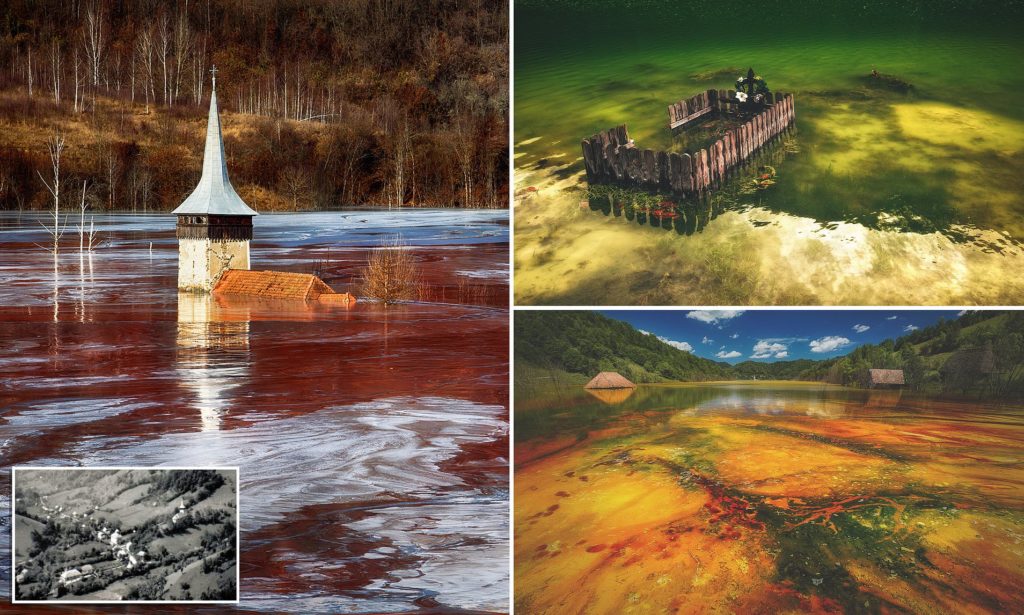
Only the top of a church tower pokes through the scarlet, polluted waters which now covers the western Romanian ghost village of Geamana
Now onto something happier, as the poem is depressing. Here is the crest of the Transylvanian Unitarian Church, something holy. Something to chase out this cursed poem.
Song/Video
The Most Important Geological Site in the World, Siccar Point by Iain Stewart
I decided that from now on, at the end of each blog I shall include a favourite song/video of something geology related that I liked.
I used this video for a PowerPoint on the connections between the Scottish Enlightenment and geology, it is an awesome video!

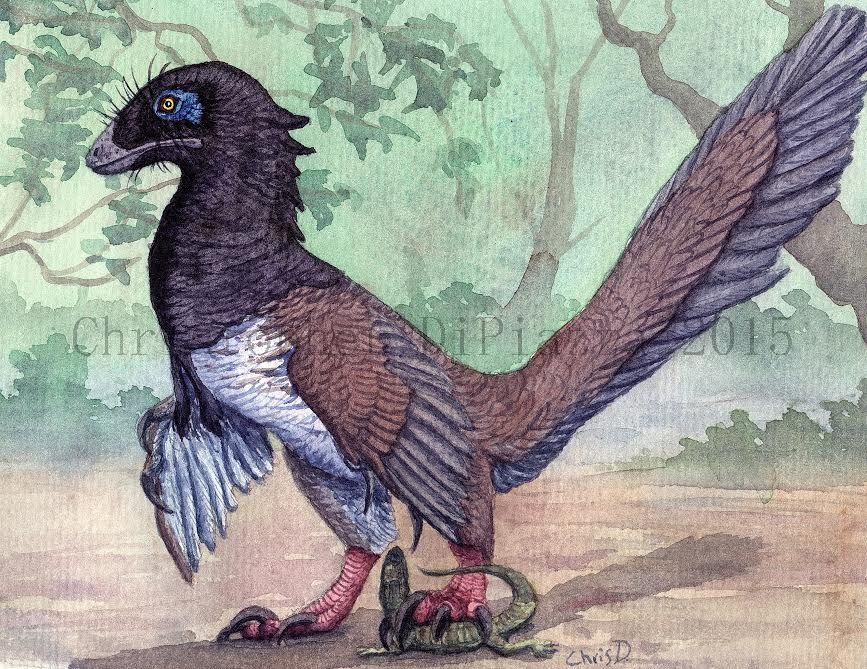



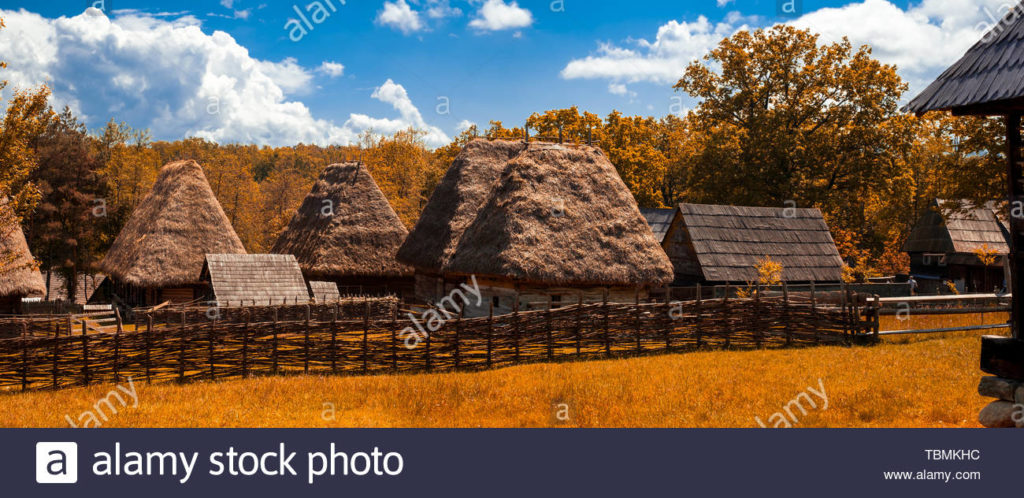

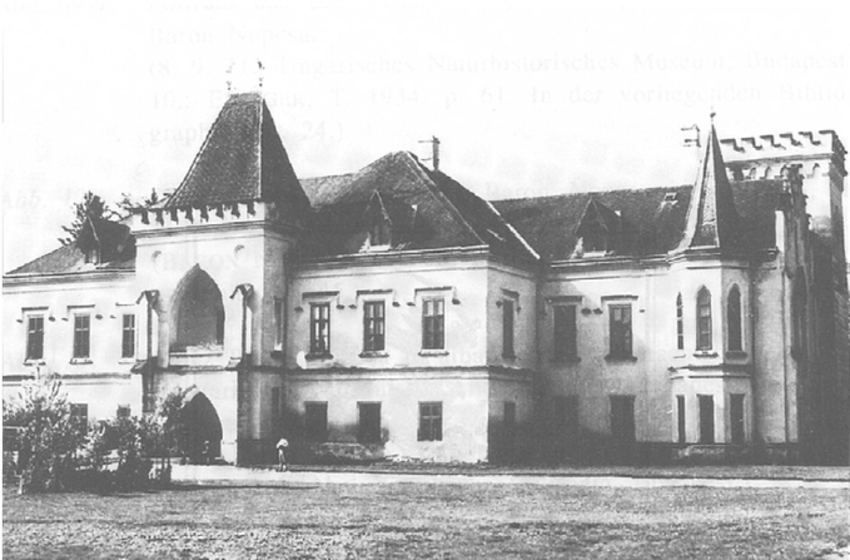

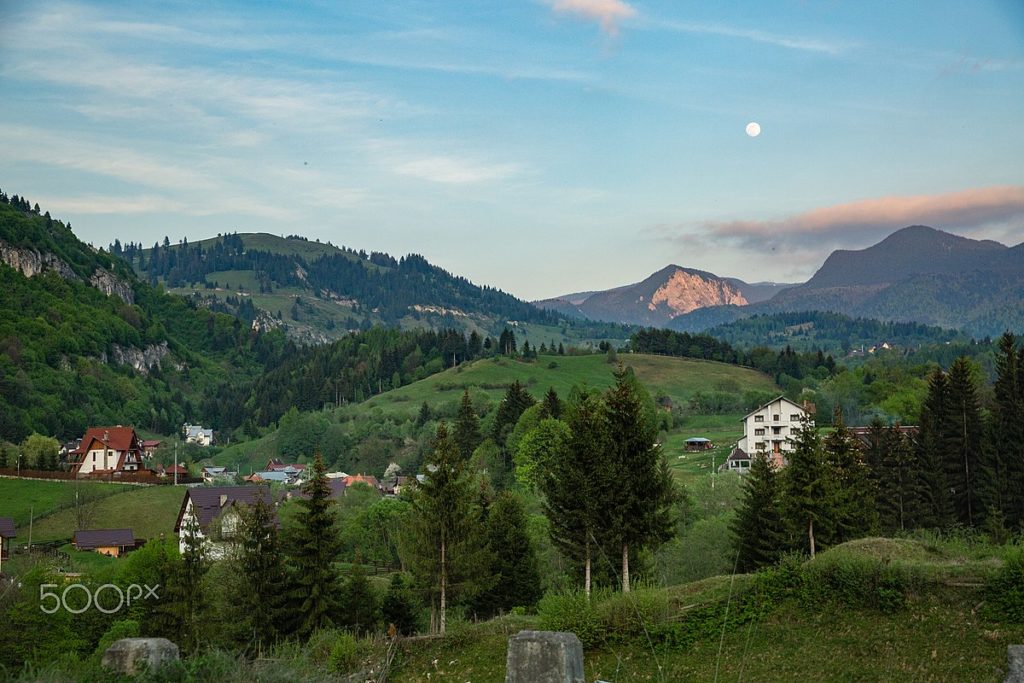

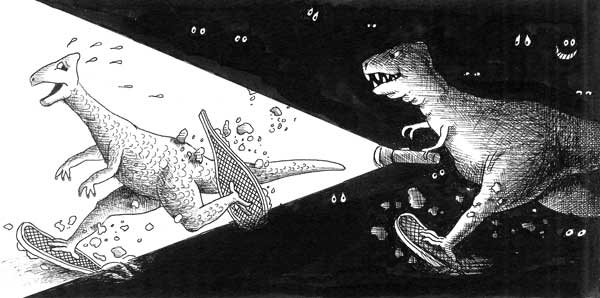

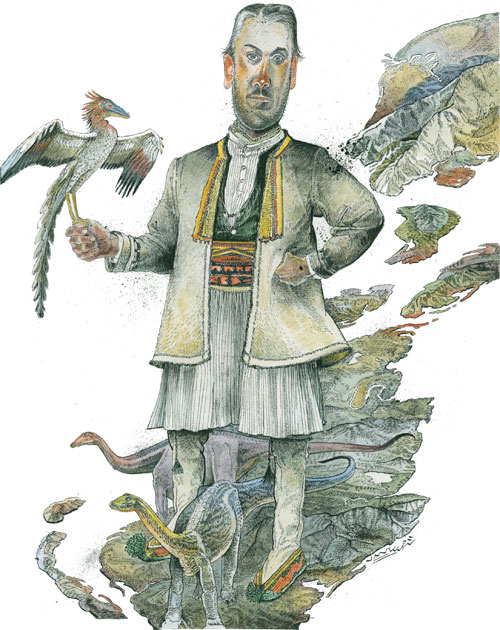



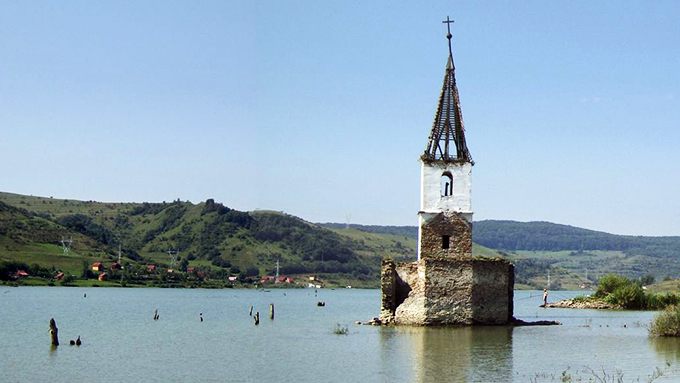


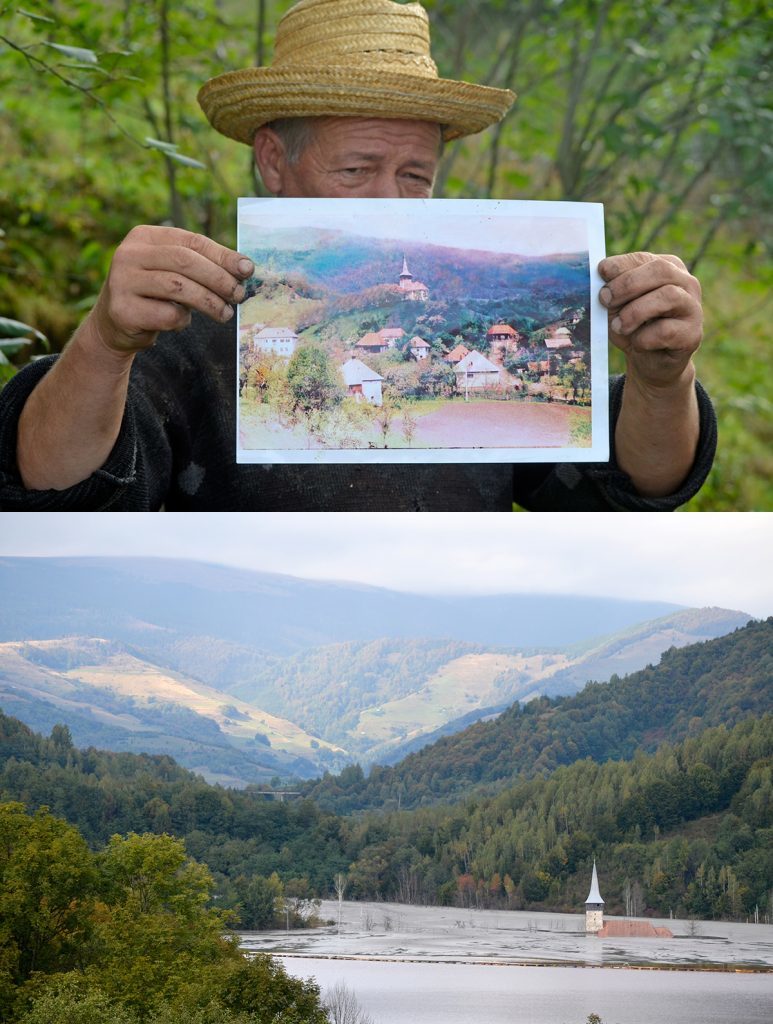

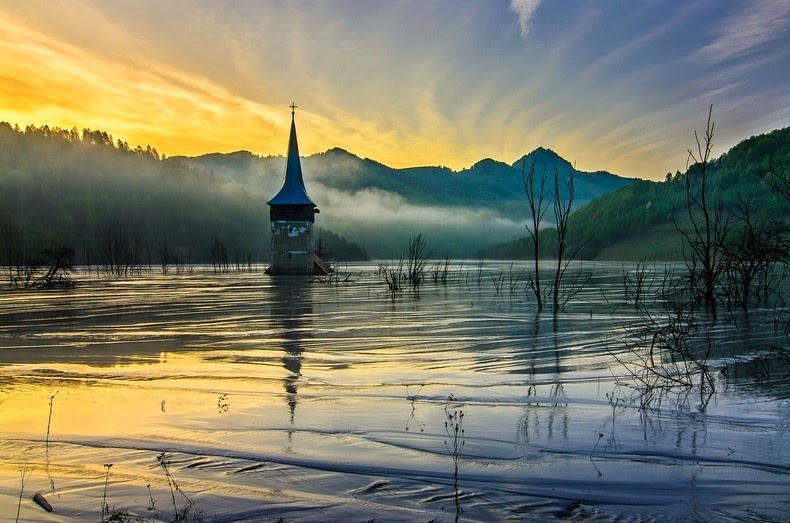

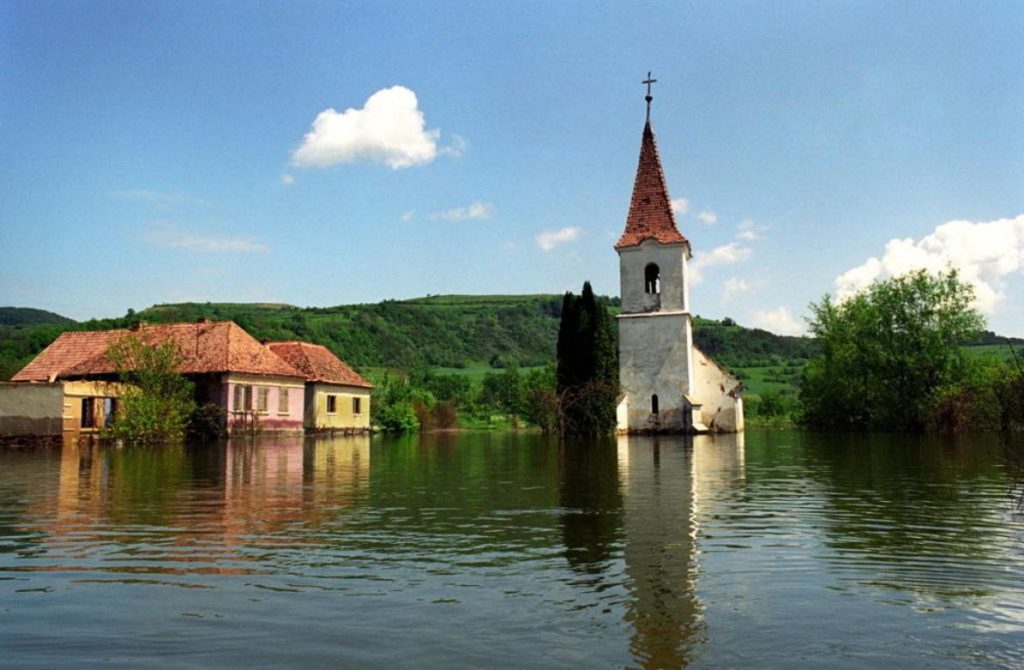

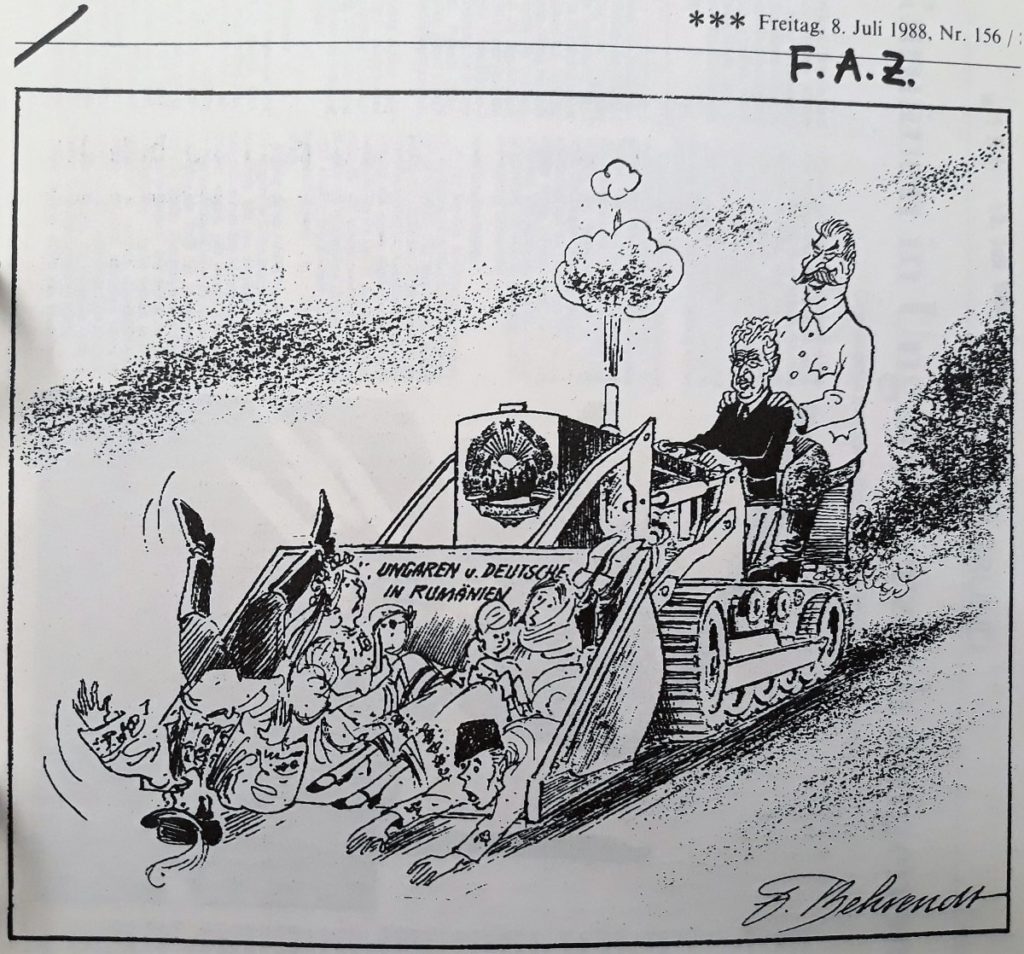



Comments
Post a Comment